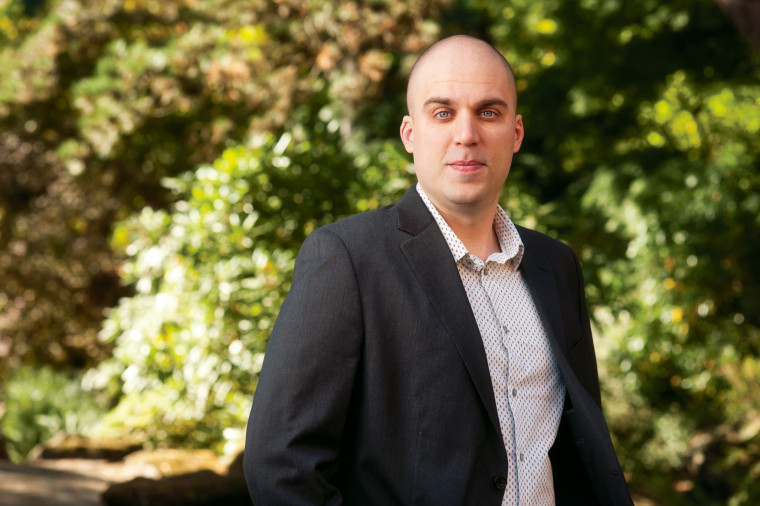Libraries—They’re Not Just for Kids
Open gallery

by Pauls Toutonghi
I was busy. I’d been raising children whose chief occupation, as far as I could tell, was the destruction of private property. Although—to be totally honest —they didn’t shy away from destroying public property, either. Could I take them anywhere? Or would their innate savageness be unstoppable— a rampage—twin toddler Godzillas, set loose on whatever poor city they came across?
And yet.
The Toutonghis spent a month in Scotland this spring, in Edinburgh. I was there for a month at the Hawthornden Castle International Retreat for Writers, and my family had come along. I figured we’d be deported. It wouldn’t happen at once—not on the first day we were there—but possibly on the third or fourth day, once a shopping mall was burning or the crown jewels had been stolen by my sweet, yet voraciously acquisitive, daughter, Beatrix. Her brother would turn her in.
“She’s the one you’re looking for,” Phineas would say, giving her up to the police—imagining a lifetime of double portions of birthday cake, eating in absentia for his imprisoned sister, who’d be somewhere far away (but still beloved), in a cake-free jail.
And yet.
No arrests were made. The children loved the city. We, as parents, loved the city. There were wide sidewalks, very little climbable fencing, a complete absence of Toys “R” Us. We spent many days in the public parks, poking very few Scottish children in the eye.
But then one day—walking home—there it was at the end of the street, something that strikes terror into the heart of every parent. Something that you can prepare for, emotionally, but never really expect to see. It was shocking. It was frightening. It shook me to the core of my being.
A mobile library van.
We hesitated at the door.
“Should we go in?” I asked The Toutonghi Wife (who prefers to be called something else—she has suggested Queen Toutonghi, Princess Toutonghi, or, more simply, just Goddess).
“That depends,” she said. “Can they sue us, internationally?”
I braced for chaos. For irrational demands. For tears. For wailing.
“I want to draw in the books!” “I want to keep the books forever!” “I want to build a giant book tower in the road and it’s not fair that you won’t let me and you don’t love me at all!”
And that would just be Queen Toutonghi. Imagine what the toddlers might do.
The children walked in. Through the door, no less. They approached the librarian, and greeted her with a polite “Good morning.” I waited for something to go terribly wrong. But no. The children ran—but only to the bookshelves—where they pawed through the books with polite joy.
We returned to Portland with a new fire ignited in the kids’ imaginations. They were full of questions. When could we go to library, here in town? Did every library have wheels? What about vans? Was every van full of books? What about those vans, papa—they asked me—the ones parked down by the railroad overpass in the warehouse district near Powell Boulevard?
We didn’t visit those vans. But we did end up at the Multnomah County Library, at the Woodstock Branch. And—walking through its tall glass doors—I was astonished by the flood of memories. I remembered a dozen images from my childhood, remembered walking up the rainy, concrete steps of the Northeast Branch of the Seattle Public Library, scouring the stacks for books—for the Hardy Boys, at first, but gradually for plays and realistic novels. I remembered feeling like I was on a journey of discovery—that I had an inexhaustible set of choices, a map that would continue to grow and expand, even as I walked within it. Even as I drew it, myself. I’d discovered personal freedom with that first library card.
But that library card? When I visited the front desk—I found that it had expired.
A recent Pew Research Center survey, “Libraries at the Crossroads,” reported that while 87 percent of American children visited a library in 2012 in order to borrow books—only 65 percent of 18- to 29-year olds reported holding an active library card. In my 20s, I’d become a part of that 22 percent. I’d lost my way. But now—with my kids—I was back.
My son was on fire for animal books, and—sure enough—we had a dozen of them within a few minutes. My daughter was partial to Pinkalicious. If you don’t know about Pinkalicious—and the vast sea of Pinkalicious tie-in titles—then clearly you are not a 5-year-old girl. If you are a 5-year-old girl, allow me to congratulate you on reading to this point—and for your surprising mastery of literary content.
Once I’d renewed my card, I checked out James Wood’s How Fiction Works, which I’d been meaning to read for years. And—over the next three weeks—I actually read it! Not to the children, who felt it had a noticeable lack of pictures. But in quietude. To myself. Silently. Underneath a lamp. With a mug of tea. Thirty minutes each night. Hallelujah.
Pauls Toutonghi, associate professor of English, teaches fiction writing at Lewis & Clark. His memoir about a lost dog, Dog Gone, will be published by Knopf in June 2016.
More L&C Magazine Stories
Lewis & Clark Magazine is located in McAfee on the Undergraduate Campus.
MSC: 19
email magazine@lclark.edu
voice 503-768-7970
fax 503-768-7969
The L&C Magazine staff welcomes letters and emails from readers about topics covered in the magazine. Correspondence must include your name and location and may be edited.
Lewis & Clark Magazine
Lewis & Clark
615 S. Palatine Hill Road MSC 19
Portland OR 97219

